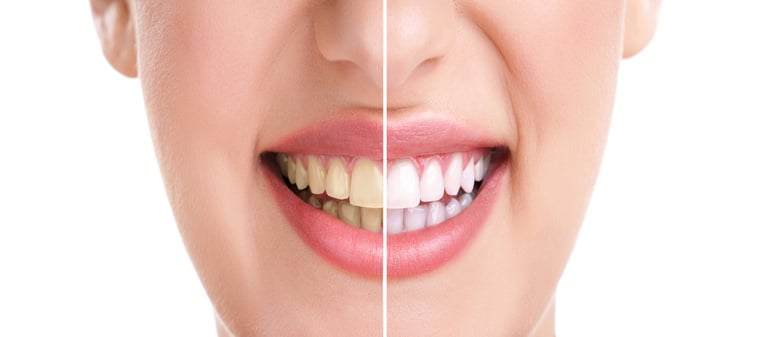Do You Need Teeth Whitening? How Does It Work?
If you have ever wondered if you need teeth whitening, the answer is yes. Teeth whitening is a very popular cosmetic procedure that can significantly improve the appearance of your smile. Many believe that whiter teeth can make them look younger and more attractive.
It is a procedure of bleaching your teeth to lighten them. The bleaching agent used is usually hydrogen peroxide or carbamide peroxide. These agents offer the desired results by breaking down the stains on your teeth and making them lighter.
What Type of Stains Do Teeth Have?
The most common type of stains on teeth are those caused by food and drink. Coffee, tea, red wine, and smoking are all common culprits. Other types of stains may occur due to medications or medical conditions.
Stains can be categorised in two ways: extrinsic and intrinsic./strong>
- • Extrinsic stains are those that appear on the surface of your teeth. They are usually easier to remove than intrinsic stains.
- • Intrinsic stains, on the other hand, occur below the enamel of your teeth. These stains are stubborn, difficult to remove, and may require more aggressive whitening treatments.
What Are the Various Teeth Whitening Options?
There are multiple teeth whitening options available. These options include:
- In-office teeth whitening: In-office teeth whitening is done by a dentist. The procedure usually takes about an hour.
- At-home teeth whitening: These kits are available over the counter or online. They usually involve using a bleaching agent and mouth tray. The procedure with at-home kits may take several days to a few weeks.
- Over-the-counter teeth whiteners: Over-the-counter teeth whiteners are available in gels, toothpaste, and rinses. They usually contain lower concentrations of bleaching agents than professional products.
How Teeth Whitening Works?
As mentioned earlier, teeth whitening uses a bleaching agent to break down the stains on your teeth. The bleaching agents like hydrogen peroxide or carbamide peroxide break down the molecules that cause the staining. This process is called oxidation.
The concentration of the bleaching agent will determine how long the treatment will take and how effective it will be. Higher concentrations will usually mean faster and more effective results. However, higher concentrations can also increase the risk of side effects such as tooth sensitivity.
Tooth whitening is not a one-time treatment. You will likely need to keep doing it multiple times yearly to achieve the desired results. How long you will have to undergo the treatment depends on the severity of your stains.
Is This Whitening Treatment Safe?
It’s generally safer to have teeth whitening treatments done by a qualified dentist or dental professional. They can assess your oral health, identify potential issues, and recommend the most suitable whitening method. Suppose you have any pre-existing dental conditions, such as cavities, gum disease, or exposed tooth roots. In that case, your dentist will make appropriate suggestions for addressing these issues before pursuing your desired whitening treatment.
The concentration of the bleaching agent will determine how long the treatment will take and how effective it will be. Higher concentrations will usually mean faster and more effective results. However, higher concentrations can also increase the risk of side effects such as tooth sensitivity.
Tooth whitening is not a one-time treatment. You will likely need to keep doing it multiple times yearly to achieve the desired results. How long you will have to carry out the treatment will depend on the severity of your stains.
Is This Whitening Treatment Safe?
It’s generally safer to have teeth whitening treatments done by a qualified dentist or dental professional. They can assess your oral health, identify potential issues, and recommend the most suitable whitening method. Suppose you have any pre-existing dental conditions, such as cavities, gum disease, or exposed tooth roots. In that case, your dentist will make appropriate suggestions for addressing these issues before pursuing your desired whitening treatment.
Are There Any Risks Involved with Teeth Whitening Options?
- Tooth sensitivity: Teeth whitening can cause temporary sensitivity of the teeth and gums. This sensitivity is usually mild and will go away within a few days.
- Gum irritation: The bleaching agents can irritate the gums. This irritation is usually temporary and will go away after treatment.
- DDamage to tooth enamel: The bleaching agents used in teeth whitening can damage the enamel of your teeth. This damage is usually not permanent and can be repaired by your dentist.
Are Teeth Whitening Results Long-Lasting?
The time the results last will depend on your lifestyle and habits. Factors that can shorten the duration of your results include:
- Drinking too much coffee, tea, or red wine
- Smoking cigarettes or cigars
- Eating foods that can stain your teeth (e.g., curry)
- Not following proper oral hygiene habits (e.g., not brushing or flossing regularly)
You can prolong the teeth whitening results by avoiding these habits and undergoing touch-up treatments as needed.
How Much Does Teeth Whitening Cost?
The price you pay for a teeth whitening treatment depends on the whitening method you choose, the location of the dental practice, and whether the treatment is performed by a professional in-office or at home.
Professional Professional in-office whitening treatments tend to be more expensive than at-home options. Over-the-counter whitening products are generally the most budget-friendly choice, but they might provide less noticeable results than professional treatments. It’s recommended to consult with a dentist to understand better the available options and their associated costs based on your requirements.
Who Should Get Their Teeth Whitened?
Teeth whitening treatment is particularly beneficial for those who have experienced tooth discolouration due to aging, consumption of staining substances (like coffee, tea, or tobacco), or poor oral hygiene. If your teeth have lost their natural brightness and wish to rejuvenate your smile, teeth whitening might be a suitable option. However, it’s important to approach teeth whitening with realistic expectations. While it can provide noticeable improvements, the extent of whitening can vary depending on your unique dental characteristics and the method chosen. Before proceeding, you must ensure that your oral health is in good condition, so you must have no dental concerns like cavities or gum disease to get the best results possible.
What are teeth whitening touch-ups?
Teeth whitening touch-ups are periodic treatments that you can undergo to maintain the results of your teeth whitening. The frequency of these treatments will vary as per your lifestyle and habits. Touch-up treatments can be done at home or in the office.
In-office touch-up treatments are usually quicker and more effective than at-home treatments. However, they are also more expensive. At-home touch-up kits are available for purchase over the counter or online. These kits usually involve using a bleaching agent and mouth tray.
If you consider getting your teeth whitening treatment in Melbourne, you must talk to your dentist first. They can help you decide which teeth whitening method suits you and your smile. Call us on (03) 9646 2577 or drop an email at [email protected] to get answers to all your queries related to our teeth whitening procedures.
Is Teeth Whitening Right for Me?
If you want to avail of professional teeth whitening treatment in Melbourne, you must talk to our team at Dentist Port Melbourne. We can help you decide which teeth whitening method suits you and your smile. To connect with us, call us at (03) 9646 2577 or at [email protected].
FREQUENTLY ASKED QUESTIONS
What is teeth whitening?
Teeth whitening is a cosmetic dental procedure that lightens teeth by removing surface stains and discolouration. Teeth whitening is one of the most requested services at the dentist, and it’s a quick and easy way to improve your appearance. There are many products and methods available for teeth whitening. Your dentist can provide you with custom trays to use at home with bleaching agents, or they may offer an in-office bleaching treatment. In-office treatments are typically more expensive but can produce quicker results. It’s essential to speak to your dentist before starting any teeth whitening treatment to make sure it’s appropriate for you and will not cause harm to your
Is discolouration of teeth common?
Yes, discolouration of teeth is quite common. It can be caused by various factors, including smoking, drinking coffee and tea, and eating foods that stain teeth (such as berries or curries). Teeth can also become discoloured as we age. Fortunately, there are a number of ways to remove tooth stains. Professional teeth whitening treatments are an effective way to achieve a brighter smile, but over-the-counter products can also help lighten teeth. However, it’s essential to consult your dentist before starting any at-home whitening treatment, as some methods may not be safe for everyone.
Can you remove stains permanently with teeth whitening?
Yes, stains can be removed permanently with teeth whitening. However, it is essential to note that teeth whitening is not a one-time treatment. It is necessary to perform the treatment regularly to maintain the results. There are various teeth whitening methods available, such as in-office and at-home treatments. In-office treatments are more expensive but offer quicker results. At-home treatments are less costly but require more patience and time to achieve the desired results. The main active ingredient in teeth whitening products is hydrogen peroxide. This substance breaks down into water and oxygen, which bleaches the teeth and removes stains. There are different concentrations of hydrogen peroxide available in over-the-counter teeth whitening products. Higher concentrations are only available from dental professionals.
Will a Teeth Whitening Procedure Work If I Have a Crown or Veneers?
Teeth whitening procedures generally do not affect dental crowns or veneers. Crowns and veneers are usually made from materials like porcelain or ceramic, which are not responsive to traditional teeth-whitening agents. This means that if you have crowns or veneers, they will likely maintain their original colour despite any teeth whitening treatments you undergo.












